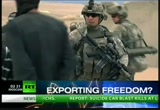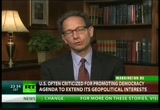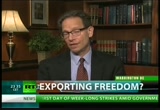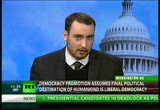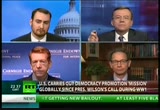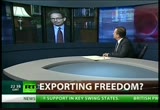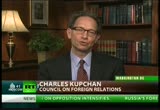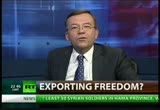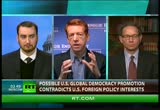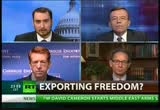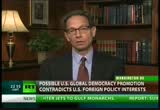tv [untitled] November 5, 2012 5:30pm-6:00pm EST
5:30 pm
5:31 pm
twenty years after the end of the cold war the united states and many of its allies continue to support individuals and groups around the world with the goal of influencing or even overthrowing foreign governments as america's influence declines relative to the rise of others is democracy promotion still in washington's interest. to cross-talk the export of democracy i'm joined by my guest in washington john glaser he's an assistant editor and blogger for antiwar dot com thomas carruthers he is the vice president for studies at the carnegie endowment for international peace and charles koch and he is a senior fellow at the council on foreign relations and a professor of international affairs at georgetown university hi gentlemen cross-talk rosen a fact that means you can jump in anytime you want john if i can go to you first where is america's democracy promotion program globally since the end of the cold war and in particularly in light of the the the uprisings in the arab world well
5:32 pm
the u.s. has been very trap the de says about democracy promotion contrary to what you hear in the rhetoric of politicians and it's most apparent we can just look at most recently in the. arab spring. the u.s. held on to my mubarak as long as he possibly could and only ever since we've been very trepidations about actual democracy taking hold their inbox rain we're holding back in you know helping the khalifa regime suppress pro-democracy movement there in yemen we did sort of the regime change with that you know didn't have much much to say about democracy was a one single candidate election and across the region and that's been true since after the cold after the. after world war two the u.s. has has preferred what what wanks like to call stability but wait what normal
5:33 pm
people like to call tyranny ok tom where do you came in on this because lot of talk about democracy paralysis certainly true that the. yes absolutely it's certainly true that the arab spring has presented harder choices for the united states than it faced in say central and eastern europe in the one nine hundred ninety s. where it clearly seemed that democratization would be in the u.s. interest or in latin america in the same period john's right that in the arab world the united states face spaces mixed interests on the other hand he didn't mention libya where the united states joined a military intervention that did help lead to what's probably pro-democratic change for the arab world does present a mixed picture but i think it's actually compared to how the united states has approached democratic change in most other regions in the last twenty years ok tom if i could stay to stay with you do you think that the nato intervention in libya was in the name in the purpose for democracy or just geo political interest the un resolution yes the u.n. resolution was about humanitarian intervention in france and britain in the united
5:34 pm
states ended up taking further in and carrying out an intervention that helped lead to regime change i don't think it was due to sort of deep sinister economic interests i think the united states france and britain actually had the best interests of the b. and actually in their minds and helped contribute to an outcome which will probably be better for libya in the long run than continued khadafi rule would have been ok charles where you came in and this. well i think that you know democracy promotion has been part of the american creed since the very beginning regionally it was more a by example than by coersion and then after world war two the united states has become somewhat more forceful in the terms of export democracy part of it is moral and ideological the view that people should have a right to choose their own governments and part of it is material that is geo political interest the view that a world that is dominated by democratic states will be more peaceful stable and prosperous than the alternative i think the real difficulty is in turning those
5:35 pm
principles into practice we have some examples such as the occupation of germany and japan that went well you have stable successful liberal democracies but in the middle east it looks much more difficult in the interventions in libya and in afghanistan and iraq i think are are much more nuanced much more ambiguous and i agree with what john said and that is the u.s. is walking is walking very carefully here under under no illusions that to rush toward the ballot box in a place like bahrain or saudi arabia yeah it would imperil some core american interests so john if we go back to you you don't see the united states promoting voting in saudi arabia any time soon do you though the people in bahrain are denied that no of course not. that's right the people in bahrain are denied several democratic rights and the people in saudi arabia of course that's
5:36 pm
one of the most horrible autocratic regimes in the world and it's also one of our closest allies and that actually happens that's you that's you can see that right through what charles said you know it's true that it's democracy promotion has been a creed of an american creed for a long time but all that really means is that it's been in bedded in the rhetoric of our political leaders where it hasn't shown up as an actual policy the middle east is a fine example as i said of supporting a range of autocratic dictators and not just supporting dictatorship but actively suppressing democracy you can see the same thing in in central america and in fact the work of mr caruthers actually speaks to this. where the u.s. was most involved in various countries in central america what you actually saw was a decline in the mocker see in a continuing support of autocratic regimes and we can see that straight through
5:37 pm
it's also i think the case in haiti and. that's fine tom go ahead. it's certainly true that the united states is often inconsistent in its policies with respect to democracy but the fact that it's inconsistent doesn't mean it's insignificant united states has come in on the side of democracy in many countries and the fact that we're still very close to the saudi regime i think is in an unfortunate in many ways and is a reality of our economic and security interests there but the fact that you have some cases that fall on one side of the line doesn't mean there haven't been many significant cases on the other and so i don't think we should overstate the fact that the united states isn't always in consistent to say therefore that u.s. democracy promotion is just a sham ok charles i mean the idea of democracy is pretty important shouldn't you we shouldn't be consistent. you know i would go even further than tom and say that not only has the united states turned a principle into practice but it has in some ways gone overboard the whole strategy
5:38 pm
of the one nine hundred ninety s. was about expanding the democratic space in europe that has pushed latin america in the democratic direction with very positive and significant results the places where i think we've got in trouble is a certain naivete about how difficult it is or how easy it is to get democracy to take root and in some ways i think the interventions in afghanistan and libya even vote very noble in their belief that we could get stable democratic regimes at the other end have become black holes and have drawn the united states in in a way that is adverse to its long term national interest you know johnny if we can look at afghanistan for example or iraq briefly go right ahead. well yeah just briefly before afghanistan and iraq you know it's interesting it's true that maybe from the thirty's to the late sixty's our policies towards places like
5:39 pm
central america were much more egregious and much more sort of blatantly in favor of dictatorship i can mention a number and go down the line but now yes it's true it's a little less egregious we can still talk about places like say hunder us where the obama administration has supported the military coup that took place there in two thousand and nine. a giant giant increase in human rights abuses as occurred by the government there were supporting paramilitary groups there are da basically commando style troops are in there there's been a number of incidents where civilians have been killed and this is all in the name of the drug war and but it's basically about keeping control over at least a few states and central america. so this is i mean and to mr caruthers point at you know what does it say about our commitment to democracy when it only occurs when democracy happens to conform to our interests which i think on the whole tends
5:40 pm
to be less often than usual with regard to afghanistan iraq i mean these are perfectly legal and i know we've heard john why don't you hold that there and understand it's like tom respond to your question go ahead tom. things very good point you write us policy is that it's a balance between security interests economic interests and different kinds of political interests and in some cases they all go together nicely and in some cases they don't and it's an unfortunate sort of fact of u.s. policy in the fact of a major power with many different interests in the world in honduras three example i wouldn't say the united states supported a military coup a coup occurred there the united states tried to intervene diplomatically to broker an agreement that would lead to a new election in that regard i think actually contributed to a peaceful resolution of the century a constitutional and political crisis there it's true that the us drug war does put the united states sometimes on the side of security forces that violate human rights and that's an example of one interest overriding another so it's certainly
5:41 pm
true that u.s. policy in latin america has been messy over the years it has gotten better there still is a conflict with the drug war but if you look more broadly around latin america and around other parts of the world you will see the united states standing on the side of democracy in many places ok charles it sounds like america stands on the side of democracy on accident sometimes and when it's workable otherwise they just throw it out the window. i think say that's putting it a bit too strongly i think that the way tom put it is is more accurate in that there are tradeoffs involved in the united states would like to see countries be more democratic and more mindful of human rights but there are times in which that goal runs up head on into national interests and so you have to just ask cold hard questions should we throw the saudis and the bahraini under the bus if it means that oil prices go to two hundred dollars a barrel and the straits of hormuz are closed should we decide that we want nothing
5:42 pm
to do with the chinese because they are not only among the for when china is a growing power and has huge effect upon america's interest my answer that question is easy no way ok gentlemen to jump in here we're going to a short break and after that short break we will continue our discussion on america's export of democracy stay with our team. and if you. want to. i'm in sochi the u.s. city in europe on the host of the twenty fourteen winter the pick a. thank you.
5:43 pm
5:44 pm
5:45 pm
5:46 pm
ok john i'd like to go back to you i mean you're all my guests are in washington today john let's say for example exactly actually example it's a reality you know iraq is not turning into the democratic away says that everyone in washington hoped in two thousand and three and it's getting closer aligned to iran ok and then let's look at egypt ok what if the egyptians have a referendum to end the peace treaty with israel and they do it democratically ok in iraq they do things democratically as they understand it but be they become enemies of the united states so democracy comes back and hurts american interests quote unquote. that's right and as as has been established democracy is only a good thing in washington's eyes if it conforms to washington's interests so if israel does something like rescind the if sorry if egypt does something like ricin the peace treaty with israel suddenly we're not going to be so welcoming of democracy in egypt same to similar thing may have may have happened in two thousand
5:47 pm
and six in gaza when the hamas won an election that george bush was trying to bring in bring up in actually make happen and then you know when the palestinians voted the wrong way us in israel you know the us supported israel in imposing a harsh economic sanctions regime on gaza so again we're seeing this this unfortunate balance. that's thomas caruthers word balance between security interests and economic interests and the interests of democracy and human rights and i just want to you know i don't know why that should be acceptable i mean let's think about this on a single country scale what if we had a president who said well allow democracy you people to have your rights so long as you don't threaten any of my interests in my power we wouldn't accept that here and i don't know why people in saudi arabia should accept it i don't know why people in honduras should accept it i don't know why people in iraq should should accept that
5:48 pm
you mention iraq just if i can finish briefly you know we went in there waxing lyrical about democracy promotion as we do in almost all of our interventions and what we saw was we deposed a dictator who by the way we formally supported and then we helped bring to power nouri al maliki who is now taking the country into dictatorship he's cracking down on press freedoms he's ruining civil society he's arresting his political opponents and throwing them in secret torture prisons without charge or trial i mean this is not a picture of democracy. that anyone can write home about so i think we have to really be a little harder on our leaders in america and not accept this constant propping up the dictatorship around the world tom which i seriously prior to that because you know hamas is that was brought up here and what and what happens when there is a referendum in egypt and it's a democratic referendum the united states is not going to recognize it well in
5:49 pm
general the united states has done pretty well in the last twenty years from countries become more dim becoming more democratic but there are times when democratic countries and societies take advantage of the democracy and make a decision that's not good for us interests and we have to learn to live with that in the philippines for example in the one nine hundred eighty s. after marcos fell democracy returned to the philippines and they voted to remove a u.s. military base the united states went along and accepted that and in the middle east now you see the united states learning to adjust to a different kind of government in egypt and actually making i think it's a serious effort to get along with the muslim brotherhood led government in the hopes that you know the united states in a different egypt can get along i agree that the intervention in iraq was misguided and that the united states as charles said greatly overestimated its ability to bring about a political transformation of iraq but that was a military intervention carried out for other reasons which was then justified and tried to turn into a political reconstruction mission ok charles what do you think about that because again there's a lot of hypocrisy here and people on the ground see it ok the americans will
5:50 pm
support this democratic movement but not that one i mean how do you explain it to them i think you just straight like we're doing on this show and except the idea that there are moments when the united states can lean forward and push democracy there are other moments when the tradeoffs are too dear and therefore the united states eases off but i would agree with tom is that when it when it comes to the arab spring the u.s. has a general done a pretty good job it is dealing with the muslim brotherhood and. said of political actors that for a long time most american politicians saw as taboo of a relationship between egypt and the us isn't bad egypt has stood by its its peace treaty with israel so i would say so far so good and on iraq you know it didn't turn out as the bush administration had hoped for i agree with what john said that this is
5:51 pm
a government that is day by day getting more centralized and perhaps even autocratic what do we do about it are we supposed to invade again and spend another ten years in iraq trying to get them to some point it's i think you know one has why the limits of charity why oh why do american have to go and can take root only from the bottom up why why does america have to get people to a certain point ok why peter you know i like to challenge a little bit the way you've been talking about the subject you keep constantly for a minute is american democracy promotion the interesting thing is that almost every establish democracy in the world whether it's brazil india korea spain australia canada engages in different kinds of international support for democracy there's a tendency i think particularly from the russian point of view to see this sort of democracy promotion subject as a particular american obsession or preoccupation in fact almost every establish democracy contributes in different ways through diplomacy and through
5:52 pm
a sincere but tom do they use or do they used to be i'm going to see it in the military so how do you use the military at the same time all the other kind of as you mentioned no they don't the united states is an extremely thin but i think it is very often well know a lot of people on the ground they see american democracy they see drones for days the missiles they see bombs and they see death ok they do see that the fact that those you know they do in this part of us geo strategic policy and interests but that's not the core of what democracy promotion is there is the misuse in some cases of trying to attach a democracy rationale like to the intervention in iraq. but just focusing on that is missing the larger picture of the value of this overall democracy it's important to talk about the value of democracy john if if the outside world left the arab world alone could it democratize all by itself or does it need such a helping hand. well i think we might see movements towards democracy i mean the arab spring is a good example i like and you know
5:53 pm
a lot of americans like to say that america was somehow at the forefront of democracy promotion of the middle east and you know now we see the arab spring but in fact that was an organic. thing that the thing that happened in it was not pushed by anyone else a lot of people in the arab world want democracy but i want to say we have to start questioning also where the u.s. gets the right to be meddling in so many countries whether it's promoting democracy as washington sees fit or suppressing democracy as we've all so often seen washington do where is the u.s. get the right to be doing all this i mean if we want to talk about democracy it was in two thousand and nine that a pew research center poll of americans said forty nine percent of americans almost half think that the u.s. should quote mind its own business around the world and leave countries to their own interests and let them get along as best they can on the rhone that's a quote from the poll if we're so interested with democracy why don't we pay
5:54 pm
attention to half of america who thinks that meddling in other countries and trying to shape certain outcomes and basically you know having dominion over the world and having control over which countries go which way is not the right kind of foreign policy that just government should have i think we should go you know look to the founders into washington's farewell address we have no right to be meddling in so many countries controlling their governments and trying to shape what outcome they see charles you want to feel that go ahead. charles first well you know i'm i'm a little bit confused as to where john is coming from because before he was very much pro-democracy we should get in there and make sure that these tyrannies become democratic and and now he seems to be going now isolationist but on the broader point you know i think that the united states is today trying to figure out i never said anything like that with the middle line where it should come out on some of
5:55 pm
these key issues and in many respects i think the the over time we will see a united states that to some extent polls in its horns the involvement in iraq and afghanistan has not gone as well as many expected and i think whether romney or obama is the winner we're going to see an american foreign policy that is somewhat less costly and somewhat less ambitious and a brand of democracy promotion that focuses more on principles and example and on centive than on attempting to use the kinds of coercive tools that we see more often in the past ten years tom if i can go to you how do you see democracy promotion from the united states and its allies or the countries in world with the rise of china for example is the united states going to try to democratize china now well you know again you're put in a terms that are really not quite right most democracies support isn't about you go to a country and say i'm going to democratize you instead a country makes a step in that direction is we'd like to help we have some experience we have some
5:56 pm
resources that might be helpful to you as we're doing in tunisia or in egypt or syria or china china for example is very interested in very interested in reducing corruption in the united states has offered assistance and says we could work on the rule of low through has not gone to china said we're going to democratize you actually united states has been fairly has off about china in part because of our economic relations with it so by putting it in terms of are we going to go democratize china you make it sound like a ridiculous project but if we saw a great deal of american foreign policy recently it has a curiously political reforms. not in its own interest said let's try to help in trying to influence that should we help if china is undertaking an anti-corruption or political reform should the united states try to be supportive yes i think it should ok john i'm going to be the last word in the program twenty seconds. well try to as a nice example i mean we've been doing a military surge in asia pacific north to contain china's rise because nobody should have dominion over the world except the united states we don't want to see
5:57 pm
china have the influence over states that we have and that's a good example of why the united states shouldn't be imposing its own mother thank you gentlemen for the riveting discussion thank you very much many thanks again my guest in washington and thanks to our viewers for watching us here are to see him next time and remember.
5:59 pm
30 Views
Uploaded by TV Archive on

 Live Music Archive
Live Music Archive Librivox Free Audio
Librivox Free Audio Metropolitan Museum
Metropolitan Museum Cleveland Museum of Art
Cleveland Museum of Art Internet Arcade
Internet Arcade Console Living Room
Console Living Room Books to Borrow
Books to Borrow Open Library
Open Library TV News
TV News Understanding 9/11
Understanding 9/11
